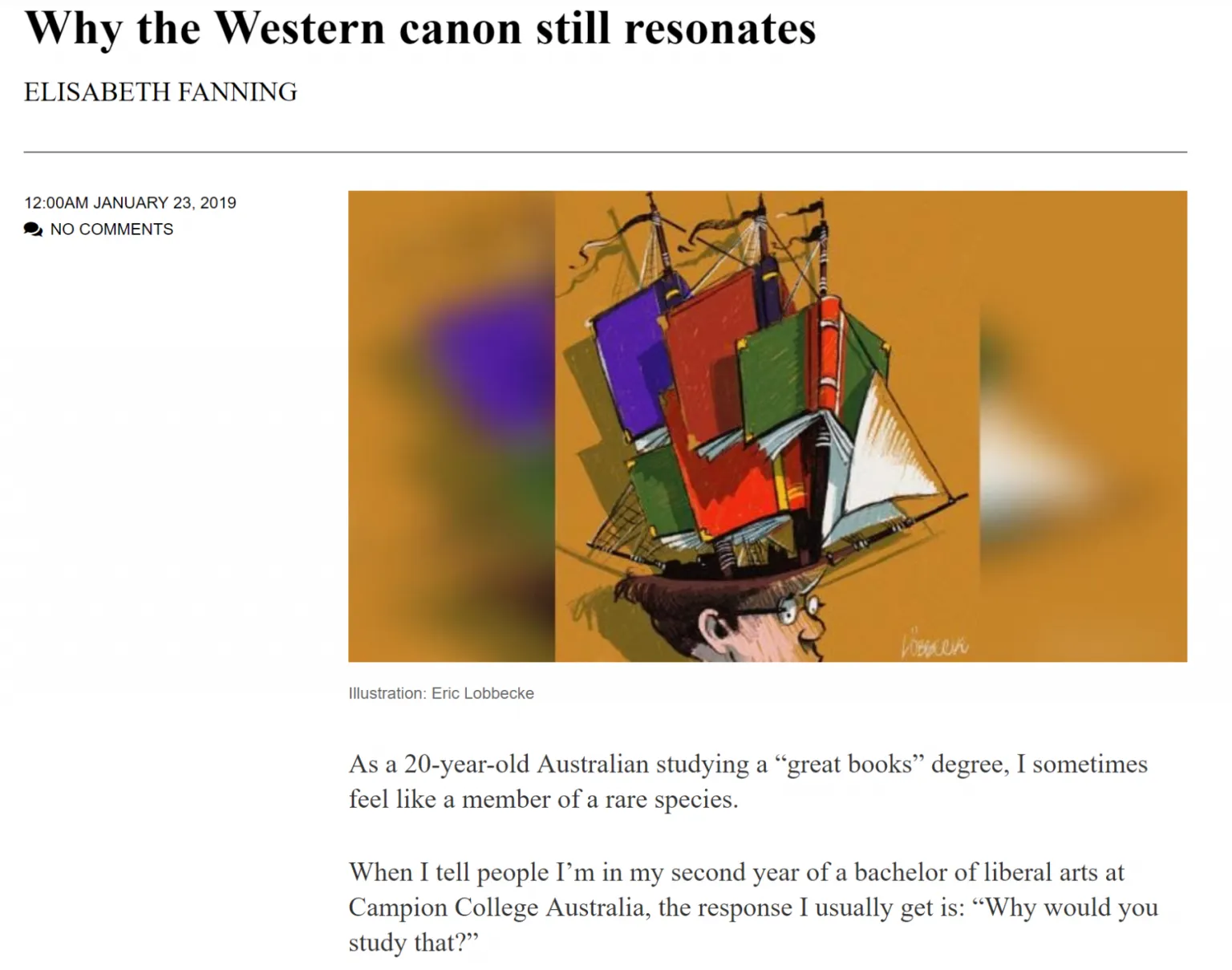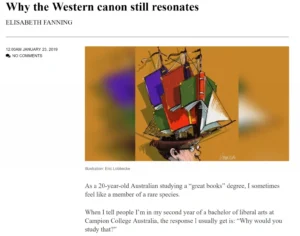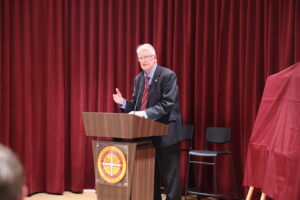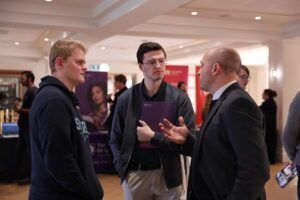Campion student featured in The Australian


Campion College is very proud of its third-year student Elisabeth Fanning, who has written a thoughtful reflection on why she chose to buck the trend of her generation and study a Liberal Arts degree at Campion College, published in today’s edition of The Australian newspaper.
The full text of the article is reprinted below.
Why the Western canon still resonates
By Elisabeth Fanning
As a 20-year-old Australian studying a “great books” degree, I sometimes feel like a member of a rare species.
When I tell people I’m in my second year of a bachelor of liberal arts at Campion College Australia, the response I usually get is: “Why would you study that?”
This common scenario demonstrates something deeper, a trend highlighted in the debate surrounding the Ramsay Centre’s proposal for a “great books” course of its own; that is, a growing disregard for the history and cultural heritage of the West.
If I were to say I was studying a bachelor of media and communications, nobody would bat an eyelid, so why has an interest in the origins of our own Western culture become so reprehensible?
Political commentator Walter Lippmann, famous for coining the term cold war, described culture as “the name for what people are interested in, their thoughts, their models, the books they read and the speeches they hear”.
This is the foundation of a liberal arts degree. They are called “great books” courses because their purpose is to return to the foundational literary works on which our culture is built, and to extract what they reveal about the culture they’ve helped form.
The liberal arts developed from the medieval trivium — the subjects of grammar, rhetoric and logic — and the quadrivium: geometry, arithmetic, music and astronomy. The trivium and quadrivium originated in ancient Greece and form the basis of our modern education system. They were intended to cultivate a critical and broad mind — truly liberalis, “fitted for freedom” — to question and understand the society in which we live.
Today, a liberal arts course covers the “great books” of the Western canon. In my degree, there are four core subjects: history, philosophy, literature and theology.
Through them, I read and take the time to understand works as varied as Aristotle’s Metaphysics and F. Scott Fitzgerald’s The Great Gatsby. Studying philosophers ranging from Plato to Marx encourages me critically to evaluate cultural ideas and norms, and to question accepted ideas.
I don’t deny other perspectives are also important but, first and foremost, I wish to learn about the development of the culture I live in. An understanding of other areas of learning should never be dismissed, but a study of our culture should look at all the important influences that have shaped it, and Western civilisation is an important influence on our culture.
Through a “great books” approach, I can develop an understanding of this part of our history, forming a basis from which I can better understand and appreciate other cultures and histories.
So many of the values we Australians prize so highly come from our Western roots, an obvious example being democracy.
I’ve gained a far greater understanding of our own parliamentary system by studying Thucydides’s account of Pericles and his development of government in ancient Greece. While studying this, I learn about the historical context as well as the philosophies that were in play at the time. In this way, the broader picture becomes clear.
Eventually we get to study Australian history itself, nestled in the wider context of ideas and events that led to it.
Through my study I’ve discovered how important it is to understand the basis of institutions and concepts so integral to the way we live.
Freedom for the individual — intellectual, economic and religious — is another concept that has developed strongly in the West, and its value is clearly witnessed by the millions of refugees and migrants who seek to enter Australia and other Western countries every year.
Similarly, it was in the Western intellectual climate that ideas such as Copernicus’s astronomical observations and Newton’s laws of motion were born.
In my degree, I am able to explore how scientific inquiry was fostered in the West, allowing for such discoveries.
However, I do not hold all of Western history as praiseworthy. I deeply disapprove of much that occurred in the West, such as the atrocities committed during the years of colonialism, but can anyone honestly say they approve of everything that occurred in the history of their own culture?
To dismiss the whole of Western civilisation because of atrocities that were committed is to throw the baby out with the bathwater.
Moreover, we cannot move forward without a clear knowledge and understanding of our past.
As Marcus Garvey, a leader of the black nationalism movement at the turn of the last century, said: “A people without the knowledge of their past history, origin and culture is like a tree without roots.”
To those who ask me why I study Western civilisation, this is the reason; it is because I want to understand the ideas, events and philosophies that have brought us to where we are now. I believe we can learn from them.
I agree with Garvey; without a knowledge and understanding of our history as a whole, Western or otherwise, our culture will lose its roots and eventually wither.
Elisabeth Fanning is a third-year undergraduate at Campion College, Australia’s first tertiary liberal arts college, based in western Sydney.



